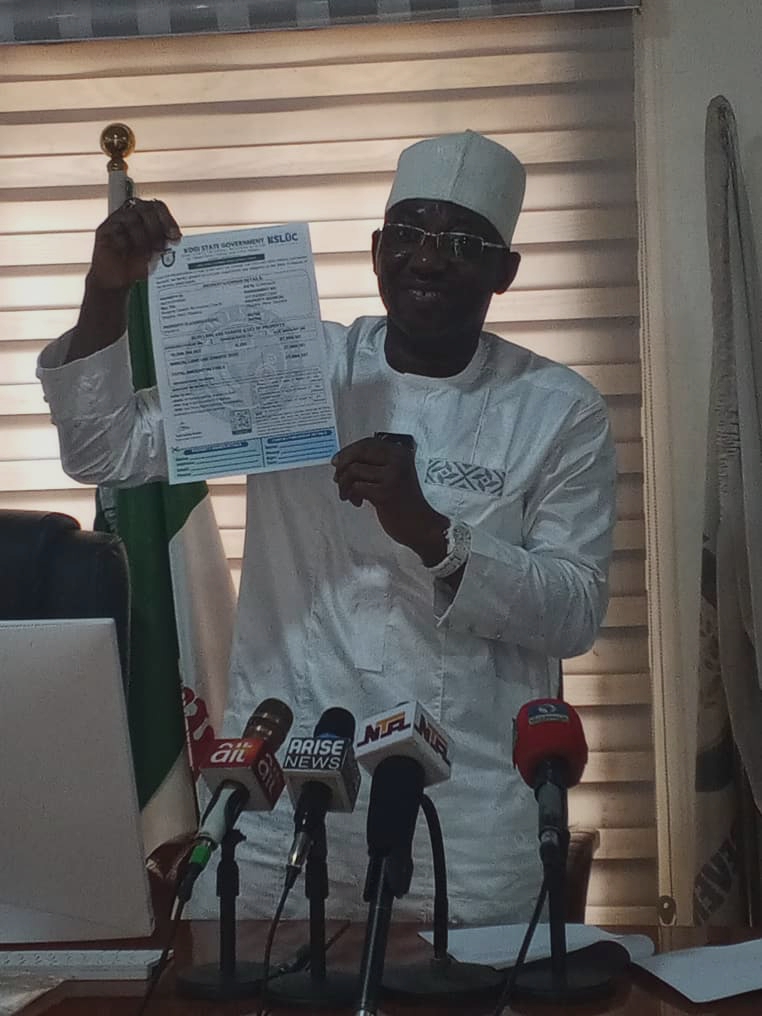By Joy Salami
The Kogi State Internal Revenue Service (KGIRS) has officially launched the implementation of the Land Use Charge Law 2024, marking a significant step in the state’s commitment to enhancing infrastructure and sustainable revenue generation.
The initiative, which has been in the pipeline for months, aims to streamline tax collection, enhance transparency, and provide a structured revenue system that benefits both the state and local governments.
Speaking at the press briefing to unveil the implementation of the law, the Executive Chairman of KGIRS, Alhaji Sule Enehe, described the Land Use Charge as a crucial investment in the state’s development. He emphasized that the system has been fully automated, and the online portal is now live for property owners to access and manage their payments seamlessly.
I am pleased to announce that the Land Use Charge is now fully ready for implementation. We are set to serve mandates to property owners across the state. This charge is not just another tax, it is an investment in better infrastructure, improved public services, and a more prosperous future for all Kogites, Enehe stated.
Enehe explained that the initiative ensures equitable taxation, particularly for those who do not pay income tax due to the nature of their businesses.
Unlike income tax, which some individuals can evade, the Land Use Charge is tied to physical properties. As long as your property exists, you are expected to contribute to the state’s development, he said.
To promote fairness and accountability, the automated system features a structured process for objections and reviews. Property owners who believe their assessments are inaccurate will have the opportunity to challenge the charges through a transparent dispute resolution mechanism.
There is a dedicated forum where objections can be raised, reviewed, and corrected if necessary. This ensures fairness and efficiency in the implementation of the Land Use Charge, Enehe added.
However, he clarified that certain categories of properties will be exempt from the charge. Traditional and ancestral mud houses in rural areas will not be taxed, with the focus primarily on urban areas with structured buildings, roads, and public amenities.
The revenue generated from the Land Use Charge will be shared between the state and local governments, with 40% allocated to local councils. Enehe emphasized that this will provide local governments with a steady income stream to support grassroots development initiatives.
In his words, We want every citizen to understand that their contribution, even as little as ₦10,000 annually, directly impacts their community. With this system in place, citizens have the right to demand accountability from the government.
By implementing the Land Use Charge Law 2024, Kogi State aligns itself with progressive states like Lagos and Edo, which have successfully adopted similar tax structures. The reform is expected to establish a sustainable revenue base, reducing the state’s dependence on federal allocations while funding critical infrastructure projects.
As we transition to a modern revenue system, we are fostering agile decision-making, smart cities, and digital governance. The success of this initiative will not only benefit the government but also improve the living standards of our people, Enehe concluded.
Speaking on behalf of the Kogi State Government, the Senior Adviser to the Governor on Revenue Generation, Rahaman Nasir Ichanyi, assured that the funds collected would be used judiciously for public welfare and infrastructural development.
This reform, conceived by the government, has now become a reality. His Excellency Alh Ahmed Usman Ododo is committed to ensuring that every naira collected is spent transparently for the benefit of all,” Ichanyi stated.
He called on journalists and media professionals to play an active role in educating the public, dispelling misconceptions, and encouraging compliance with the Land Use Charge.
With this enforcement, the Kogi State government is urging all property owners to fulfill their civic responsibilities, assuring them that the benefits will be visible in better roads, improved public services, and economic growth across the state







